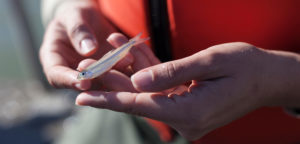A favorite food of the southern sea otter is black abalone, a marine mollusk that has historically put down roots in rocky intertidal zones from Southern Oregon to Baja. This once-abundant creature—one of seven abalone species found off California—is nearing extinction and has moved one step closer to protection under the Endangered Species Act. The nonprofit Center for Biological Diversity (CBD), which filed the 2006 petition for listing, says the species has declined by as much as 99 percent over most of its range.
In the 1980s, black abalone off the Channel Islands suffered a massive die-off from an insidious disease known as withering syndrome, which causes severe weight loss, detachment of the animal from its rocky substrate, and eventually death. The syndrome was thought to occur only in Southern California, but the National Marine Fisheries Services reports that mortality patterns along the Central California coast suggest that withering syndrome is moving north. “Because the disease is more virulent in warm water,” says CBD’s Brendan Cummings, “as the sea temperatures off California and Oregon rise due to global warming, the deadly symptoms of withering syndrome are likely to spread [north].”
The National Marine Fisheries Service is scheduled to make a decision regarding listing by the end of 2007. If listed, the black abalone will be one of just four marine invertebrates protected by the Endangered Species Act.




